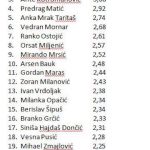The €783 million programme will allow Croatia to provide state aid for renewable electricity generation with the help of numerous technologies. The scheme will contribute to reducing carbon dioxide and other greenhouse gas emissions in accordance with the EU’s Green Deal objectives and objectives regarding environmental protection, which is part of the Croatian recovery and resilience plan without unnecessarily disturbing market competition on the single market, Executive Vice-President for Competition Margrethe Vestager said on Thursday.
Croatia informed the EC of its intent to introduce the new support programme for electricity production from renewable sources – wind farms, solar power plants, hydropower plants, biomass plants, and biogas and geothermal power plants.
State aid will be granted in the form of premium on top of market prices of electricity. The premium will be defined by a competition procedure and will not be higher than the difference between the average cost of production for each of the technologies to be used to produce energy from renewable sources and the market price of electricity. Beneficiaries will be selected following calls for applications to be advertised in the period from 2021 to 2023.
That programme will be open until 2023 and support will be paid to beneficiaries for a period of 12 years.
The EC assessed that the programme is in line with EU state aid rules and in particular with the Guidelines on State Aid for environmental protection and energy 2014 – 2020.
The EC found that the support is necessary for the further development of renewable energy production and to help Croatia meet European and national environmental protection goals. Support has a motivational impact because electricity prices do not cover the entire cost of renewable electricity production hence, without the support there would not be any investments by the selected beneficiaries.
The EC also found that the support is proportional and limited to what is necessary because the level of support will be defined in a competition and cannot exceed the difference between the market price of electricity and the cost of production.
The Commission also found that the positive effects of the measure, particularly those on the environment, exceed possible negative effects in regard to possible market competition disruptions.










